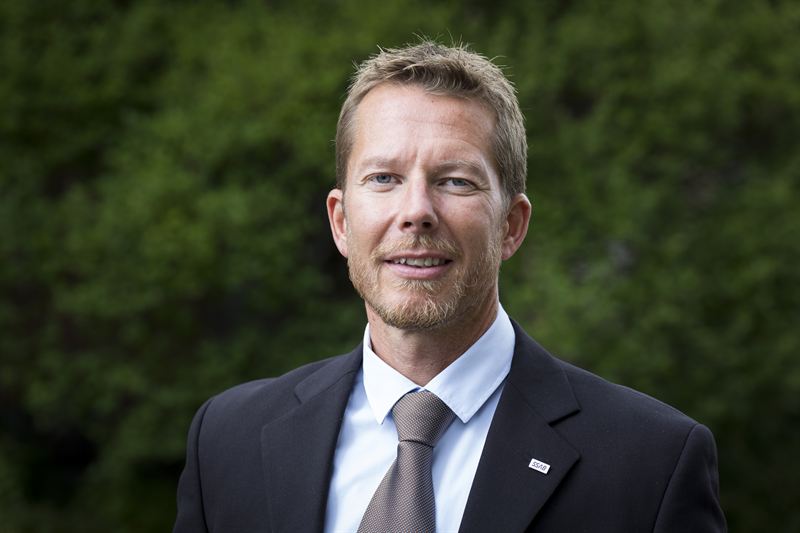Research and development work to support the strategy
We interviewed Eva Petursson, head of strategic R&D at SSAB, Carl Orrling, head of the SSAB One concept and technical development in SSAB Europe and Joachim Larsson, head of product development at SSAB Europe to hear their thoughts on the role of R&D in supporting our strategy.
Can you tell us something about R&D at SSAB?
Carl Orrling: “R&D at SSAB is seamless work between the technical personnel and other functions. It involves representatives from different functions such as marketing development, sales and production.
Seamless collaboration is not empty words/an empty phrase, but a structured exchange of experiences and information. One example is SSAB’s development and innovation forums in which a broad range of representatives from across the organization participate.

Both a structured operational culture and the energy of enthusiastic people are needed. When everyone sees how important R&D is, it makes it easy to exchange thoughts inside the organization.
Another important factor is a close link to the strategy. Whether we talk about research with a 10-year window or everyday development, our activities have a clear link to SSAB’s strategy and business plans.”
What are the greatest challenges facing our R&D activities?
Carl Orrling: “The short-term challenge is to develop new premium products according to very specific customer needs, but still secure rational steel production. These products need to have excellent workshop properties for each single customer operation, but still be suited for multipurpose use.
Long term, we need to further improve the formability of high-strength steels. Another major challenge is to further reduce the environmental impacts of our steels. We have already achieved a lot in this respect. We are, for example, the first steelmaker to switch over to using organic solvents in color-coated products. Premium steels enable many eco-sensible solutions and clearly reduce the lifecycle environmental impacts of products.”
How is R&D reflected in people’s work and everyday life at SSAB?
Joachim Larsson: “Developing new grades of steel is really team work. For example, we perform most of our trial production on the regular production lines. Besides technical development and production people, we also include sales people early in the stage of product development. I think we can truly speak of work that crosses organizational boundaries.

Before we start a new project, we always do a three-part pre-study. First comes market research headed by the market development team. This is followed by concept development by the production development team. Thirdly comes a study of the production possibilities done by production. This three-part feasibility study means we take different viewpoints into account."
How can research and development advance our goals and increase sales of premium products?
Joachim Larsson: “We focus highly both on improving existing premium steel grades and developing new grades and offerings. For instance we recently launched a revolutionary new M43 steel grade combining high hardness and good toughness for agricultural use. Some 20 customers are now testing M43 during the harvest season and there has been much interest.
“Whilst it’s important to develop product quality and performance from the perspective of technical properties, our ability to develop the quality consistency of our products is at least equally as important, as is ensuring consistent product quality within a customer delivery and between different deliveries. This is SSAB’s traditional strength, but the value of consistent properties increases with growing automation in steel industry.
I consider there to be a huge market for our premium products. The greatest challenge is not getting a customer already familiar with the benefits of premium steels to upgrade to a new, improved steel grade, but to get everyone to see the advantages of using premium steels instead of standard steels.”
R&D is usually considered as a long-term activity. How can it help us to achieve the goals of our strategy?
Eva Petursson: “R&D has played an important part whenever we launch a new product or a product version with new, improved technical properties.
Research and development is often thought of as one concept, although they are really two distinct things. Research is by nature a long-term activity, whereas development generally has a much shorter time span. It might include daily improvements or even a medium-term activity relating to new products or services. In SSAB, the same development team usually works with both basic research and the continuous improvement of existing products.

Understanding customer needs is an important part of R&D. SSAB can be rightly proud of its long history of working with customers and taking their perspective into account. We naturally use our extensive “experience archive”, especially in high-strength steels, for the benefit of our customers.”
Nowadays R&D increasingly takes place in collaboration networks. How is this reflected at SSAB?
Eva Petursson: “We work very closely with strategic partners and universities. With universities, we both support and promote the education of new engineers, whilst also participating in joint research and development projects.
Development of the new generation GreenCoat color-coated bio technology products in the building sector is a good example of networking with both universities and paint suppliers.
R&D is also collaboration with customers. It’s important to point out that we offer advanced technical support to all our customers using premium or special steels regardless. Everyone receives technical help – even customers who buy smaller volumes.
Customers understand their own needs best and we help them to understand the properties of different steels. This is where we identify the optimal solution for the need of a particular customer."
Read also:
Premium recipe to improve product mix
https://www.ssab.com/globaldata/news-center/2017/07/05/09/27/premium-recipe-to-improve-product-mix
Category and tags



